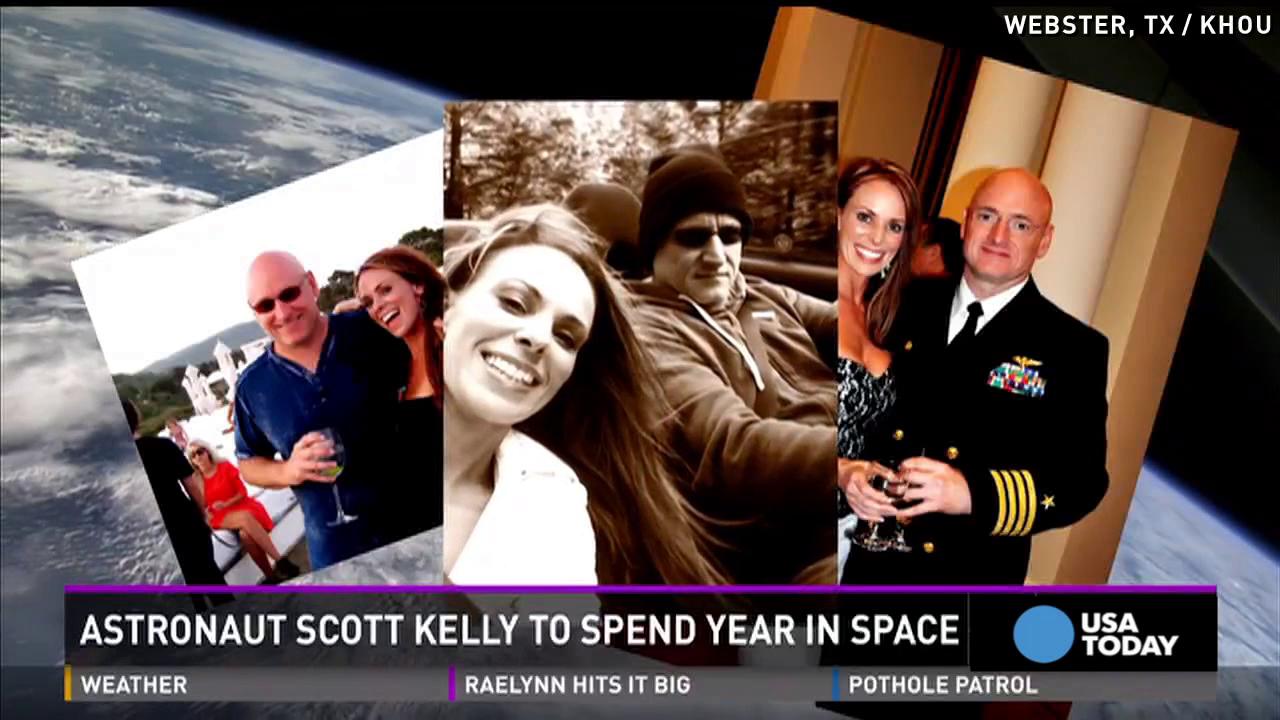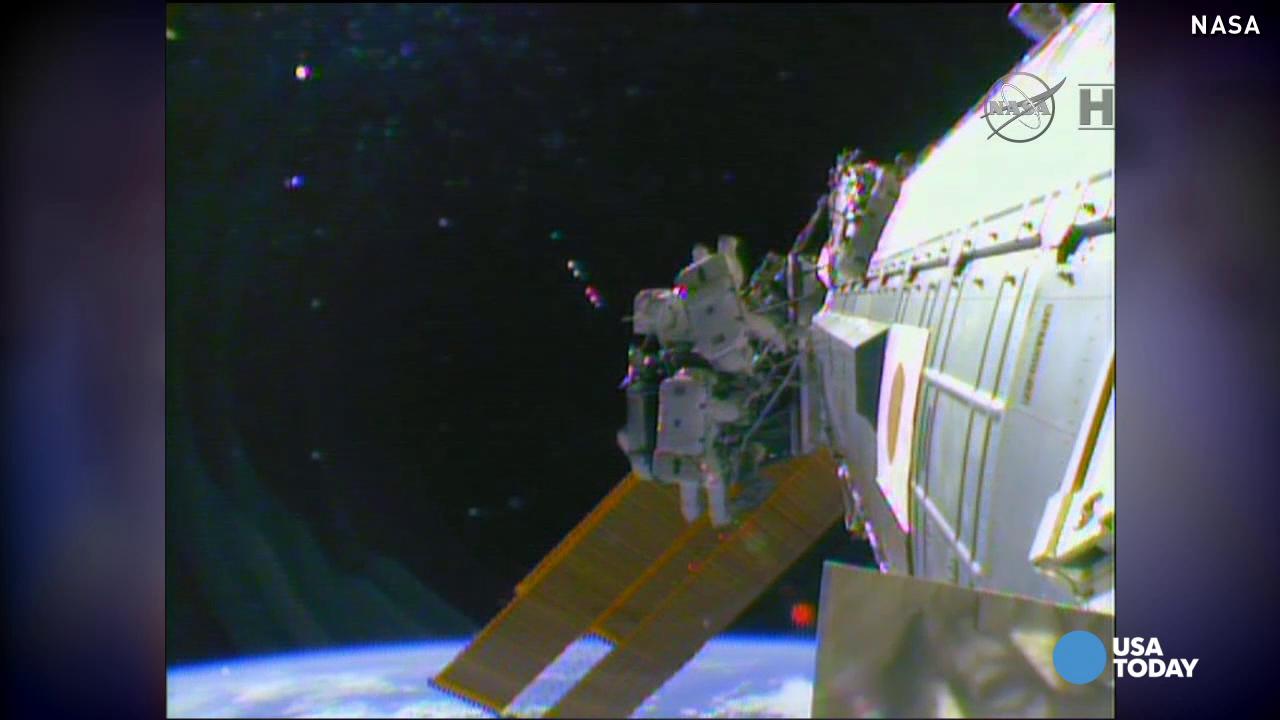Luke Skywalker
Super Moderator
{vb:raw ozzmodz_postquote}:
Get the news
Log In or Subscribe to skip
321 12 [h=6]Share This Story![/h]Let friends in your social network know what you are reading about
[h=4]Astronaut Kelly launches on record-setting trip[/h]Imagine being given a year to float free of gravity, to gaze down at Earth and its changing seasons, to observe the heavens from space as few ever have. But during that time you could not to take a breath of
{# #}
[h=4]Sent![/h]A link has been sent to your friend's email address.
[h=4]Posted![/h]A link has been posted to your Facebook feed.
[h=6]Join the Nation's Conversation[/h]To find out more about Facebook commenting please read the Conversation Guidelines and FAQs
[h=2]UP NEXT[/h][h=2]03[/h]
On Friday, March 27, astronaut Scott Kelly will smash the U.S. endurance record for the longest continuous time in space. The one-year mission will provide NASA with invaluable data as his twin brother, Mark Kelly, undergoes the same tests on Earth. Sierra Oshrin
NASA Astronaut Scott Kelly has his space suit checked before boarding the Soyuz TMA-13M rocket in Baikonur, Kazakhstan on Saturday (Friday Eastern Time). Kelly and Russian Cosmonaut Mikhail Kornienko of the Russian Federal Space Agency are headed to the International Space Station for a year.(Photo: Sergei Ilnitsky, EPA)
Astronaut Scott Kelly's year in space has begun.
Imagine being given a year to float free of gravity, to gaze down at Earth and its changing seasons, to observe the heavens from space as few ever have.
But during that time you cannot to take a breath of fresh air, hug a loved one or hear the sound of falling rain. And you are confined to the office that affords those spectacular views.
NASA astronaut Scott Kelly and Russian cosmonaut Mikhail Kornienko will attempt to balance those realities during a nearly year-long mission aboard the International Space Station. They blasted off at 3:42 p.m. ET Friday in a Soyuz spacecraft from the Baikonur Cosmodrome in Kazakhstan.
Less than 10 minutes later the crew was safely in orbit. Cameras showed Kelly giving a thumbs up during the ride.
"The space station is a magical place," he said, discussing the mission earlier this month. "But you never get to leave."
They reach their home for the next year — roughly 250 miles above Earth — less than six hours later.
Cosmonaut Gennady Padalka, commander of the Soyuz TMA-16M spacecraft who will visit for a standard six-month expedition, joined them on the ride up.
[h=2]UP NEXT[/h][h=2]03[/h]
Astronaut Scott Kelly and girlfriend Amiko Kauderer prepare for ultimate long-distance relationship. Kelly will make history as NASA's first astronaut to spend an entire year in space. VPC
By doubling that mission duration for two crew members for the first time on the International Space Station — four cosmonauts lived for at least a year on Russia's Mir station — NASA and its partners hope to learn more about the issues astronauts might face on even longer voyages to Mars.
An eventual mission to Mars would last at least 500 days.
"The world is excited about your mission," NASA Administrator Charles Bolden told the crew before it departed for the launch pad. "It's the beginning of a new phase of exploration between our two countries ... and takes us a little bit farther on the journey to Mars, and that's really important for us."
The space agencies are discussing assigning more astronauts to yearlong missions.
Kelly, a 51-year-old father of two daughters ages 20 and 11 who spent nearly six months on the station ending in early 2011, was not enthusiastic about the idea at first.
USA TODAY
Street art 'invades' International Space Station
"I'll be honest with you, I wasn't all that interested," he said. "After mulling it over, talking to my family, friends, girlfriend, I decided that the challenges that staying in space for a whole year presented was appealing to me even considering the sacrifices."
Kornienko's wife cried upon learning about his second long spaceflight — this time for an entire year — but later supported the decision. The 54-year-old grandfather will fly with pictures of his family and his deceased parents.
"We have the chance to be the first to spend a whole year on the space station, and it will be of great use for future generations for science and for those who might fly further to Mars and to outer space," he said through a translator.
Kelly does not conceal how difficult he expects living on the station for nearly a year — 342 days, to be precise — to be. But he hopes he'll experience nothing like the family crisis he confronted during his first expedition.
Halfway through that flight, he learned about the shooting of his sister-in-law, then-Rep. Gabby Giffords, who is married to his twin brother, former astronaut Mark Kelly. Giffords continues to recover, but that day both Kellys endured early media reports that she had died.
[h=2]UP NEXT[/h][h=2]03[/h]
NASA astronauts have ventured back outside the International Space Station for more cable work and a lube job.
Mark Kelly came to Central Asia to see his brother launch.
Researchers will take advantage of a twin's involvement in the mission to study spaceflight's long-term effects. They'll compare how Scott Kelly responds during the year in microgravity to Mark Kelly, a four-time shuttle flier, back on the ground.
Months in space are known to cause loss of bone and muscle mass, weakened immune systems and impaired vision, but the upcoming mission will track those health effects over more time and with better medical technology than was available during Russia's previous year-plus missions.
"That's one of the reasons why we're doing this flight and flying for longer than we have before, to better understand some of these effects and how to mitigate them for our future exploration goals," Scott Kelly said.
Based on experience and advice from cosmonauts who have flown longer — the longest single trip lasted 438 days — Scott Kelly expects his biggest challenge will be pacing his workload to avoid burnout.
Appropriately, the mission patch for his Soyuz crew features marathon runners.
"I hope I get six months into this and I have six months of energy left in the battery to get to the end," he said. "I think I will."
USA TODAY
Sarah Brightman looks for her 'space song'
However, on his last flight he found that he began feeling mentally ready to return home about two-thirds of the way through — after just four months, in that case. He hopes not to feel that way so soon this time.
It might help that Kelly will participate in a busy period involving what he calls the station's "reassembly." A module and other components will be rearranged, and he'll likely perform his first spacewalk.
During free time he plans to talk to family and friends with a Skype-like phone connection, see them in occasional video conferences, send e-mails, read books and watch TV shows uplinked to him, including Houston Texans football games.
"It hasn't escaped me that I'll watch a whole baseball season, which is very long, and a whole football season," he said.
He plans to maintain a daily journal to document his thoughts and feelings as the lengthy mission progresses, experiences he'll share with scientists.
USA TODAY
Age is no barrier for astronaut Peggy Whitson
In addition to Kornienko, Kelly will spend parts of his year in orbit with 13 others coming to and going from the outpost, including the three crew members there now: American Terry Virts, Italian Samantha Cristoforetti and Russian Anton Shkaplerov. But he knows he'll miss the variety of people and weather on Earth and will grapple with the monotony of being in the same place for so long.
"You'll miss your friends and family on Earth," he said. "You also miss being able to leave, being able to go outside your place of work. It's kind of like you're at work 24/7 for a whole year."
At the same time, he's looking forward to seeing how parts of the planet change over an entire year, its thin, fragile atmosphere and visually stunning space weather phenomenon like the aurora.
By the end of the mission, Kelly's career total of 522 days in space will set a U.S. record, surpassing Mike Fincke's 382 days. But it will be Gennady Padalka, now 56 and launching with Kelly on his fifth spaceflight, who upon returning in six months will own the all-time record: 888 days, more than two years of his life.
Reluctant initially, Kelly finally welcomed the opportunity to fly in space again, perhaps for the final time, in a different and more demanding way.
"I don't think I've ever done anything that will be as hard as this," he said. "I look forward to this flight and the challenge that the duration presents."
USA TODAY
Rare peek inside the International Space Station
[h=3]Longest space missions [/h]
All occurred on Russia's Mir space station.
• Valery Polyakov: 438 days in space, 1994-95
• Sergei Avdeyev: 380 days, 1998-99
• Vladimir Titov and Musa Manarov: 366 days, 1987-88
• Yuri Romanenko: 326 days, 1987
• Sergei Krikalev: 312 days, 1991-92
Source: NASA
0) { %> 0) { %>
0) { %>
Powered By WizardRSS.com | Full Text RSS Feed
